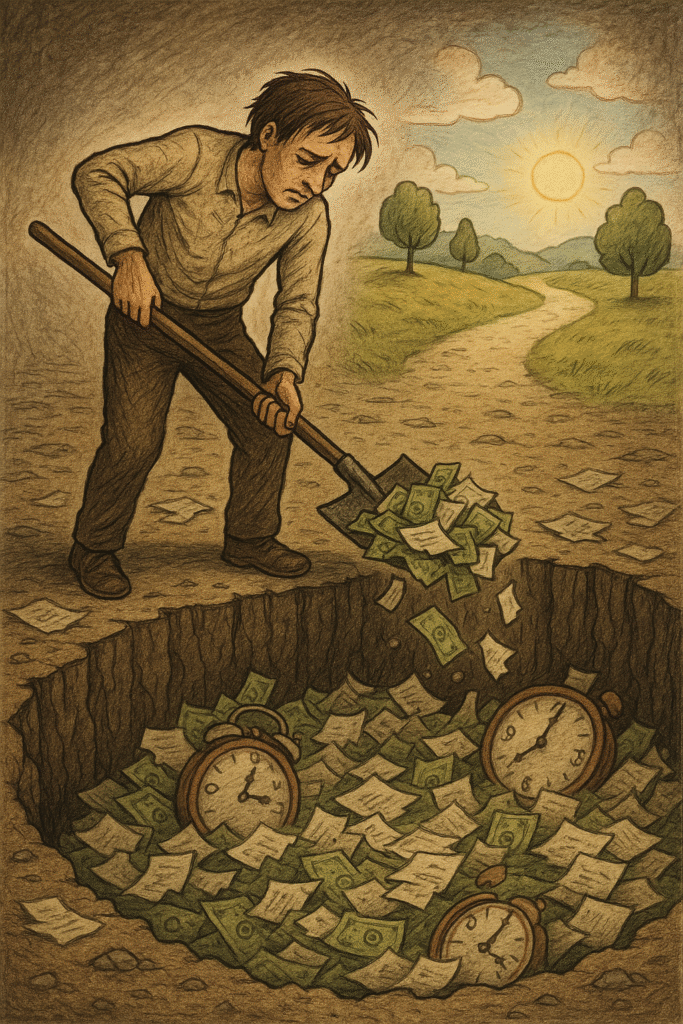Six years. A shared future. A life built together. And then I found out about the cheating. When I told a friend I’d walked away from it all, including losing my coveted public housing subsidies, she was taken aback momentarily. “But given the sunk cost, couldn’t you have tried to find a way to forget this ever happened?” It’s something I had grappled with for many weeks as I lay alone with my suspicions before finding out, which is why I could react so decisively. However, it can still be a gut-wrenching decision to make. It’s the question that haunts anyone who’s ever been betrayed: How do you walk away from years of your life?
It’s very human to cry over spilt milk under the bridge. Even governments, with a swath of resources and brainpower, fall for this trap. The British and French poured billions into Concorde, a supersonic white elephant that was clearly doomed. But they couldn’t bear to ‘waste’ what they’d already spent, so they kept throwing good money after bad. Sound familiar? Sometimes the most rational thing you can do is admit you’ve been backing the wrong horse.
When faced with the fallout of infidelity, it’s natural to feel a deep sense of regret over everything you’ve invested in the relationship—the time, effort, love, and dreams you built together. You may find yourself asking, “Was it all for nothing?” or even feeling tempted to stay in the relationship simply because of how much you’ve already poured into it. This is what’s known as the sunk cost fallacy, and it’s important to recognise it for what it is: a trap that keeps you tethered to something that no longer serves you.

What Is the Sunk Cost Fallacy?
The sunk cost fallacy occurs when we continue investing time, energy, or resources into something simply because we’ve already invested so much in the past, even when it’s clear that continuing will only lead to more loss or pain. In relationships, this can look like staying with a partner who has betrayed your trust, not because you believe the relationship can truly be repaired, but because you feel like leaving would mean “wasting” everything you’ve already put into it.
The sunk cost fallacy is basically your brain playing tricks on you. It whispers, ‘You’ve already put years into this relationship—you can’t just throw that away!’ Unfortunately, those six years are already gone, whether you stay or leave. The time you spent making memories, the effort you put into trying to make things work, and the love you gave-all of that now belongs to your history, no matter your choice. Staying won’t magically transform them into ‘worth it’ years. Holding onto a relationship out of fear of “losing” those investments will not bring them back. It could very well just mean adding more years to the pile of regret.
Regret Is Natural
Regret is a normal part of moving on. It’s human to grieve for what might have been and to feel sorrow for the time and energy spent on someone who did not value your trust. Allow yourself to feel regret-it’s genuine and understandable. Just don’t let it shape your future choices.
Regret about what’s already lost does not mean you must keep investing. Simply because you’ve spent years in a relationship does not mean you owe it more years. Just because you’ve given your heart does not mean you must keep giving when it’s no longer safe or rewarding.
Looking Ahead
Letting go of the sunk cost fallacy means shifting your attention from what’s gone to what you can still achieve. Rather than asking, “How much have I already put in?” ask yourself,
- If I met my partner today, knowing what I know now, would I choose to be with them?
- What kind of relationship do I actually want for my future?
- Am I staying because I love who they are, or because I’m afraid of starting over?
Staying in a relationship simply because of past investment will only keep you trapped in a cycle of hurt. Leaving-or deciding not to rebuild-makes room for growth, healing and new opportunities.
Think of it like this: if you were holding onto shares that kept falling in value just because you’d already spent money on them, would that be wise? Or would it make more sense to cut your losses and invest in something with real promise? Relationships are much the same-what matters is not how much you’ve already given, but whether carrying on will bring happiness and fulfilment.
A Final Reflection
It’s perfectly normal to feel gutted about ‘wasted’ time. Grieve for the future you thought you had all you want. But your life isn’t a linear journey where you need to show a return on every investment. Sometimes the wisest thing you can do is cut your losses and invest your precious time and energy somewhere it’ll actually grow.
If you want to try for reconciliation, please try to make your decision based on a forward-looking perspective instead of fearing the sunk cost. Some relationships can recover from infidelity. But that requires genuine remorse, complete transparency, and a partner willing to go the extra mile to eradicate the insecurities they have planted. It’s a difficult proposition for most, and given that your partner already has a track record of cheating, the probability of success is lowered significantly. If you’re staying purely because of time invested rather than because you see real evidence of change, you’re simply giving your pain a permanent home.
You’re not throwing away the past by choosing a different future. You’re refusing to throw away your future for the sake of the past. And that, frankly, takes more courage than staying ever could.
Take care of yourself. You’re stronger than you know, and you will get through this.
Join the Discussion on Reddit

